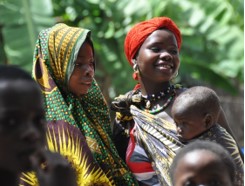Speeches Shim
INTEGRATED FAMILY PLANNING PROGRAM (IFPP) ![]() (pdf - 197k)
(pdf - 197k)
OVERVIEW
High fertility rates presents a serious health threat in Mozambique, with the total fertility rate varying from 4 to 8 with an average of 6 children per woman (DHS 2011). According to the National Malaria and HIV Indicator Survey 2015 (IMASIDA), the modern contraceptive prevalence rate (mCPR) is 25% (34% urban and 22% rural) with a high demand for modern methods of 50% and unmet need of 23%. A total of 46% of adolescent girls are pregnant for the first time or already have one child, and in this group only 14% are using any contraception method. There is also a high unmet need for family planning (FP) with 46% of women that express a desire to limit or space pregnancy not using any form of contraception. There is a high unmet need for FP especially among HIV positive women. However, few programs targeting HIV-positive women provide counseling and services for FP. IFPP will focus on young people and smart integration of FP into other services.
PROGRAM DESCRIPTION
The IFPP project seeks to implement its goal through three intermediate results: 1) increased access to a wide range of modern contraceptive methods and quality family planning and reproductive health (FP/RH) services; 2) increased demand for modern contraceptive methods and quality FP/RH services, and 3) strengthened FP/RH health systems. More specifically, IFPP aims to reach women with a particularly high unmet need for FP, namely: postpartum women; women living with HIV; adolescents, including orphans and vulnerable children (OVC); medium and high-parity women; and post-abortion women. In addition, IFPP recognizes that increasing uptake of contraception in Mozambique requires shifting inequitable gender norms. Therefore, men and boys, alongside other key influencers, are meaningfully and systematically engaged throughout all intervention areas and intervention packages.
EXPECTED RESULTS/IMPACTS
By the project end, IFPP will enable access to modern contraceptives for up to 565,000 new users. To achieve this impact, by project end, IFPP will have implemented an overarching strategy that applies a judicious mix of high impact practices coupled with local innovations to bolster FP/RH service delivery, demand generation, and health systems. Furthermore, it is expected that IFPP will increase access to a wide range of modern contraceptives and quality facility- and community-based FP/RH services by: improving the quality and adolescent-friendliness of services, supporting strategic integration of FP services into HIV platforms and maternal and child health services, expanding community-based contraceptive service provision, improving referral mechanisms and integration of community health systems, and expanding access to private sector services.


Comment
Make a general inquiry or suggest an improvement.